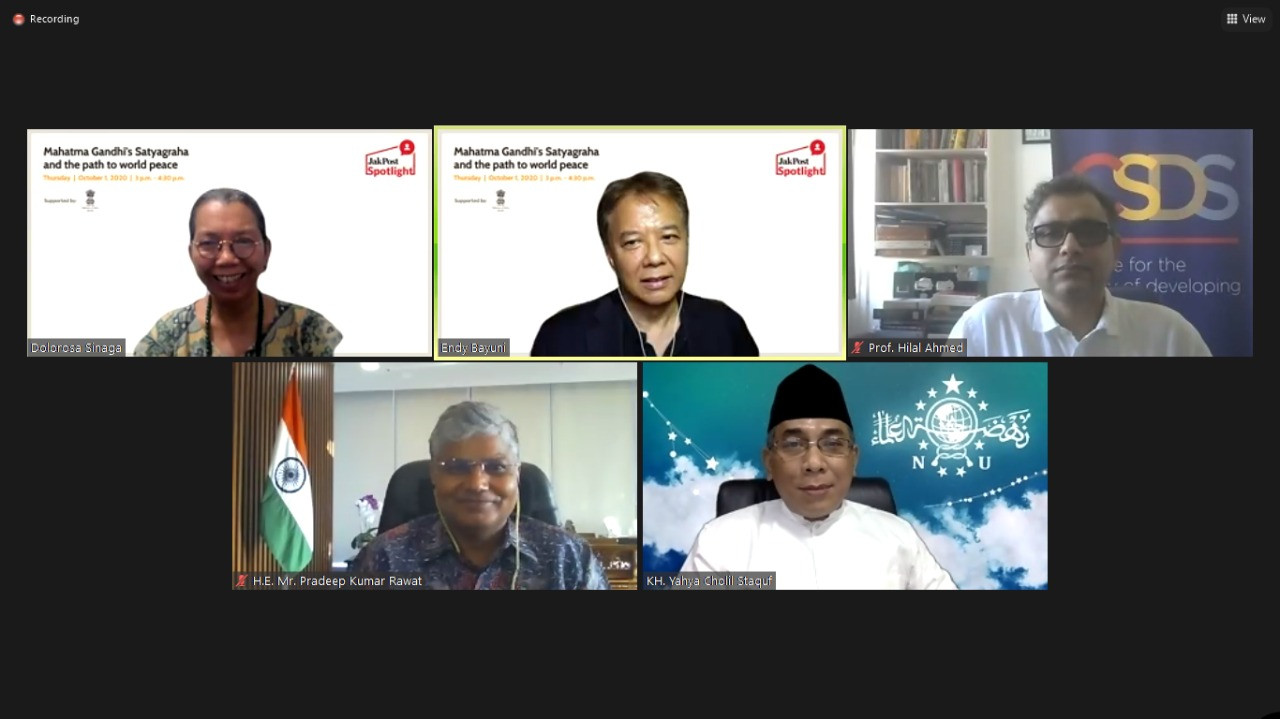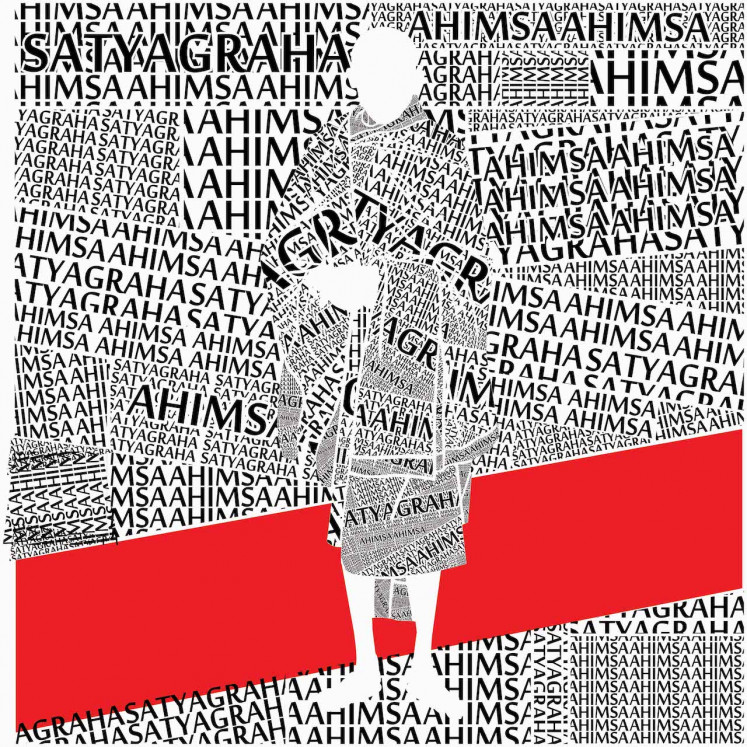Popular Reads
Top Results
Can't find what you're looking for?
View all search resultsPopular Reads
Top Results
Can't find what you're looking for?
View all search resultsMahatma Gandhi’s legacy lives on in 21st century
With a main objective to raise awareness among friends of India in Indonesia about the ideals of Mahatma Gandhi and their utility in bringing about world peace, The Jakarta Post, the Indian Embassy in Jakarta and the Jakarta Arts Institute (IKJ) jointly organized a webinar on Oct. 1.
Change text size
Gift Premium Articles
to Anyone
H
e was not even a president or prime minister of a country. When he was killed in 1948, the United Nations General Assembly paid tribute to him. In 2007, the UN declared his birthday, Oct. 2, as the International Day of Non-Violence.
He was the Father of the Nation in India. He was none other than Mohandas Karamchand Gandhi, affectionately known as Mahatma Gandhi or simply Gandhi. He was born on Oct. 2, 1869.
Indian Prime Minister Narendra Modi said recently that Gandhi did not belong to India alone. He belonged to the world. His teachings about non-violence, truth, peace, love, compassion, Satyagraha, harmony, tolerance unity in diversity have inspired many leaders, including the greatest leaders of the 20th century like Martin Luther King and Nelson Mandela, across the globe.
Even in Indonesia, both founding fathers Sukarno and Mohammad Hatta were inspired by Gandhi’s teachings. Former President Abdurrahman Wahid declared that Gandhi was his role model.
With a main objective to raise awareness among friends of India in Indonesia about the ideals of Mahatma Gandhi and their utility in bringing about world peace, The Jakarta Post, the Indian Embassy in Jakarta and the Jakarta Arts Institute (IKJ) jointly organized a webinar on Oct. 1.
The webinar, titled “Mahatma Gandhi’s Satyagraha and the path to world peace”, featured three prominent speakers from India and Indonesia. The webinar was organized as the concluding event of the two-year-long celebrations of what would have been Gandhi’s 150th birthday.
All the speakers emphasized that Gandhi and his teachings were not only important but also very much relevant in the 21st century. Since lack of mutual trust, hatred, violence, inequalities and intolerance have been plaguing our world, Satyagraha (firmness to uphold truth) is one of the best ways to achieve peace in the world.
In his keynote speech, Indian Ambassador to Indonesia Pradeep Kumar Rawat said the Resolution of the UN General Assembly to mark Mahatma Gandhi’s birthday as International Day of Non-Violence was jointly proposed by a record number of 140 countries.
Ambassador Rawat praised Gandhi as an extraordinary leader who preached about the non-violence, culture of peace, tolerance and Satyagraha.
“Peace and violence do not go together. The Satyagraha is therefore already eschewed in favor of peace, as core of Satyagraha is truth, non-violence and sacrifice,” Rawat said.
According to Rawat, many of Gandhi’s teachings were adopted by both Indonesia and India. Harmony and tolerance are important in pluralistic countries like Indonesia and India. He called on the audience to follow the principles of Gandhi in their lives.
“Let us follow Gandhi and be the change that you would wish to see in the world,” Rawat said.
Hilal Ahmed, a well-known author and associate professor at the Center for the Study of Developing Societies in New Delhi, India, described Gandhi’s Satyagraha as an “enigma”.
Ahmed, one of the panelists of the webinar who spoke on Gandhi’s legacy and the applicability of his teachings in 21st century, said that we are living in a world where there is a moral decline and a crisis of ideas. So, Satyagraha, which is not a brute force, is the best method in the 21st century to achieve peace.
Echoing a similar view, Yahya Cholil Staquf, another panelist, spoke about the relevance of Satyagraha to Indonesia, past and present.
Yahya is a prominent Islamic scholar and the general security of Nahdlatul Ulama’s (NU) Supreme Council. Indonesia-based NU is the world’s largest Islamic organization with more than 45 million members.
Upholding Satyagraha, according to Yahya, is very important as part of the spiritual enlightenment.
“Stick to what is right at all costs. Do not compromise,” Yahya said.
Indonesian state’s motto “Bhinneka Tinggal Ika [Unity in Diversity]” came from Gandhi’s teachings.
In an effort to curb hatred, promote tolerance and eradicate religious radicalism, according to Yahya, the NU has launched the Humanity of Islam.
Dolorosa Sinaga, the third panelist from IKJ, spoke about how Satyagraha can promote greater equality.
Greatest man: A painting of Mahatma Gandhi by celebrated Indonesian sculptor Dolorosa Sinaga. The artwork was created to mark what would have been Gandhi’s 150th birthday on Oct. 2, 2019. (Courtesy of/Dolorosa Sinaga)Dolorosa, a prominent sculptor and a fan of Indian culture, especially Indian music and sculpture, said that women are the biggest practitioners of Satyagraha.
The webinar was moderated by prominent Indonesian journalist and senior editor of the Post, Endy M. Bayuni.
There is an urgent need to revive the teachings and principles contained in Satyagraha, Gandhi’s concept of a nonviolent path to truth and freedom, in addressing many of our current problems in the world.
Even after his death in 1948, Gandhi’s legacy lives on. As Asia’s biggest democracies and pluralistic societies, India and Indonesia must work hand-in-hand to achieve global peace in adherence to the great teachings of Satyagraha and non-violence.











